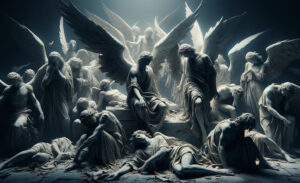When reading the Bible, it is impossible to ignore the presence and influence of spiritual beings, such as angels and demons, and spiritual beings. Their significance in biblical narratives offers a profound insight into the spiritual realm, communicating the depths of God’s power, the war of good versus evil, and the spiritual influences that exist in our world today.
Demons in the Bible

One cannot genuinely interact with biblical accounts and teachings without coming across stories that are entangled with the activity of spiritual beings known as demons. This term is mostly employed to define ethereal creatures who are malevolent in nature, who disobeyed God, and who now follow the lead of Satan, the quintessential contender against God’s authority.
The Bible frequently mentions the existence and activities of demons. Notably, during Jesus’ earthly ministry, He frequently went toe-to-toe with demons, culminating in Him casting them out of afflicted people (Matthew 8:28-34). These interactions are significant. They tell us a lot about the nature, behavior, and power of these malevolent entities and reassure us, demonstrating the supreme authority and power that Jesus holds over these demons.
The activities of demons, as depicted in the Bible, can be quite unsettling. They are portrayed as destructive entities, sow discord, incite temptation to evil deeds, and in extreme cases, possess individuals. Such possession often led to severe physical or mental illnesses, and, on occasion, even superhuman strength. A memorable instance of this is seen in the narrative of the Gerasene demoniac (Luke 8:26-39). In this account, a man possessed by a legion of demons was liberated by Jesus. The man’s subsequent transformation is nothing short of extraordinary, further indicating the destructive effect these entities can have on individuals.
But not all demons are equal. There appears to be a certain degree of hierarchy among them, possibly reflecting their ranks as angels before they fell from grace. Beelzebul, considered being the ‘Prince of Demons,’ is mentioned in Matthew 12:24. Beelzebul’s position and power among demons is recognized, even by Jesus, when He refutes the Pharisee’s misguided claims that He cast out demons in Beelzebul’s name. This occurrence suggests the internal organization within the demonic realm, even as they oppose God.
Demons also manifest in different forms and names in various incidents in the scriptures. For example, in the book of Revelation, Apollyon or Abaddon is depicted as an angel of the abyss and a king of locust-like creatures that torment people (Revelation 9:11). This entity is often interpreted as a demon, reflecting the plaintiff image commonly associated with the demonic entities.
Furthermore, it’s worth noting that when Jesus was tempted in the wilderness (Matthew 4:1-11), it was by Satan himself, a fallen angel who is the leader of these demons. It shows that demons, and Satan, relentlessly try to lead humanity away from God, even going so far as attempting to tempt the Son of God.
Despite all these intimidating depictions, one comforting fact to remember is the ultimate limited nature of this demonic influence. As much as they oppose God and aim to destroy or derail His creation, demons can do nothing beyond what God permits. The expelling of demons, as told in the Gospels, is evident proof that the power of God far exceeds their capabilities. The Apostle James affirms this when he assures believers that when we resist the devil, he will flee from us (James 4:7).
Angels in the Bible

Our exploration of spiritual entities in the Bible becomes significantly brighter when we turn our focus towards angels. As opposed to the dark rebellion of demons, angels are radiant servants of God, tirelessly working behind the scenes to fulfill His divine plans. Grappling with academic, theological, and spiritual insight into these fascinating creatures can refine our understanding of the biblical narrative and spiritual reality.
Angels in the Bible are often translated from the Greek word ‘angelos,’ meaning ‘messenger.’ The description fits well with their most prominent role as God’s couriers. Crafted by God’s hand and imbued with His purpose, angels are spiritual beings who obediently and devotedly carry out God’s commands. Their ethereal nature is different from ours. They are immortal, powerful, and sometimes able to make themselves visible in human form.
The dazzling biblical account of angels is often fragmented into different groups or rankings. This arrangement illustrates a structural order in the celestial realm. Notably, we hear often about Archangels, such as Michael, who is depicted as a defender of God’s people in the book of Daniel and a warrior against Satan in Revelation (Jude 1:9, Revelation 12:7-9).
Seraphim, introduced in the book of Isaiah, are another class of angels. These are heavenly entities that exist in a state of ceaseless worship before God’s throne. They proclaim the holiness of God in their unending hymns of “Holy, holy, holy is the Lord of hosts; the whole earth is full of His glory” (Isaiah 6:2-3). Their relentless dedication to worship highlights the sanctity and glory of God, setting a standard for worship for humans as well.
The Cherubim, first introduced in Genesis, are tasked with guarding the sacred. Notably, they protected the Garden of Eden after Adam and Eve’s expulsion to prevent them from accessing the tree of life (Genesis 3:24). Cherubim were also intricately woven into the fabric of the Tabernacle’s curtains and formed to sit on top of the Ark of the Covenant (Exodus 26:1, Exodus 25:18-22), outwardly symbolizing their role as protectors of God’s holiness and presence.
Throughout scripture, angels are commonly depicted delivering messages of profound significance or providing divine intervention during critical moments. Abraham received angelic visitors who predicted the birth of his son Isaac, and later in Genesis, an angel stopped Abraham from sacrificing Isaac, revealing God’s testing radar (Genesis 18:1-10, Genesis 22: 10-12). An angel delivered the most wonderful news of Jesus’ birth to the shepherds (Luke 2:8-10) and reassured the frightened women at Jesus’ empty tomb (Matthew 28:5-7). Angelic appearances often accompanied God’s transforming action on His people and the world.
The stories of angels’ capturing human form to interact with humankind in the scriptures add to the fascinating mystery about these spiritual beings. Notably, angels visited Lot in Sodom in human form (Genesis 19:1), demonstrating a capacity to interact within our physical reality. Hebrews 13:2 reminds us to show hospitality to strangers, as we might be unwittingly entertaining angels, indicating that such encounters might still occur.
As much as angels are dedicated to the service of God, they watch in awe of God’s work in us. As stated in 1 Peter 1:12, angels long to look into the gospel’s good news. This underlines the profound privilege we have as beneficiaries and participators of God’s redemption plan and the glory that inspired even the angels’ curiosity.
Spirits in the Bible

The term ‘spirits’ in the Bible is enveloped in a wide range of associations. From the Holy Spirit, the third person of the Godhead, to other worldly spirits, these ethereal beings play pivotal roles in the biblical arc, shaping our perception of the surrounding spiritual world and its influence.
When we dive into the biblical treatment of spirits, the Holy Spirit receives paramount prominence. This Spirit is not a detached, impersonal force but is God’s active presence among us, an integral part of the Holy Trinity comprising the Father, the Son, and the Holy Spirit. The Holy Spirit’s role and significance are fundamental in both the Old and New Testaments, underpinning God’s interaction with mankind and the fulfilment of His divine plan.
An extraordinary event recorded in the Book of Acts (Acts 1:8), recounts the Holy Spirit’s descent in the form of tongues of fire when Jesus’ disciples were gathered in the Upper Room during the Feast of Pentecost. This profound phenomenon marked the church’s birth and signified the Holy Spirit’s dwelling in every believer’s heart from then onward. This act of indwelling forever bridged the gap between humanity and God, annihilating the perceived distance and reinforcing an intimate connection between God and mankind.
The Holy Spirit in believers plays multiple transformative roles. As a Comforter, the Spirit provides solace amidst trials (John 14:16). As a Guide, the Spirit leads us into all truth (John 16:13), as a Teacher, the Spirit enables us to understand spiritual truths (1 Corinthians 2:13), and as a Sanctifier, the Spirit works within us to conform us into Christ’s image (2 Thessalonians 2:13).
However, the term ‘spirit’ in the Bible is not solely devoted to the Holy Spirit. There are references to other spiritual entities, spanning from angels and demons as spirits. And while these spirits exhibit an independent existence, they are subordinate ultimately to the will of God.
It is also imperative to note that the Bible acknowledges the existence of evil spirits. Instances like the spirit that pestered King Saul (1 Samuel 16:14) paints a grim view of their destructive influence upon human life. However, the recognition of their existence should not drive us into a frenzy of fear but rather draw us closer into reliance upon God, our refuge and fortress.
Hellish spirits or demons, as we have discussed previously, indicate rebellious angels who align with Satan in his campaign against God. These depraved supernatural entities are pervasive within biblical narratives, perpetually seeking to derail God’s plans and mislead His created beings.
Another category of spirits mentioned in the Bible includes ‘unclean spirits,’ which signify impure, morally corrupt spiritual beings. These are often associated with demonic forces and instances of possession resulting in physical or mental ailments, as seen in Mark 1:23 and Matthew 12:43.
Spiritual warfare is another theme interwoven with the realm of spirits, representing the ongoing battle between the forces of God and the forces of evil in the heavenly realm (Ephesians 6:12). The effects of this warfare spill into our physical world, influencing the course of nations, communities, families, and individuals.
Common Misconceptions
Discussions surrounding spirits such as angels and demons, and spiritual beings often breed misconceptions, especially in contemporary culture. It’s important to clarify these misunderstandings to protect and uphold a biblically rooted perspective on these celestial and ethereal entities.
One pervasive misconception is the overemphasis or underemphasis on these spiritual entities’ roles. Some perceive that angels, demons, and spirits directly result in every event that transpires in their lives, both positive and negative. This belief often leads to an overreliance on charismatic manifestations, sometimes causing individuals to seek an angelic intervention or see demons behind every misfortune. On the contrary, others entirely downplay or deny the influence of these spiritual beings, rendering the spiritual world irrelevant or mythical.
Both these extremes are off-kilter. While it’s important to acknowledge the activities of angels, demons, and other spiritual entities in our world, everything that happens isn’t solely attributable to them. Human decisions, natural laws, and God’s sovereign will vastly influence life’s circumstances. Above all, God’s sovereignty towers over every other force, spiritual, or otherwise.
Interactions with Humans
An honest interaction with the Bible will reveal many instances where these spiritual entities actively intervened in human life. These interactions varied from comforting and guiding to influencing and even possessing.
Biblical narratives elucidate several incidents where demons tragically influenced or possessed individuals. The boy tormented by a demon in Matthew 17:14-18 is a sobering example. Instances like this underscore the destructive influence that demons can bear upon humans. These narratives do not exist to create an ambiance of fear but to impart an understanding of the spiritual realities that dovetail our physical existence.
In contrast, angelic interventions in human life were largely positive and transformative. Stories of angelic appearances punctuate the Bible, often bearing life-changing messages or timely help. Daniel’s encounter with an angel in the lions’ den (Daniel 6:22) dramatically underscores an angel’s protective role, bringing comfort and reassurance to believers in God’s protective provision.
The role of spirits, particularly the Holy Spirit, is most transformative. The Holy Spirit guides, empowers, comforts, and indwells believers (Acts 2:1-4). This divine companionship enables understanding of spiritual truths, providing conviction, maturation, and equipping for Godly living.
Significance for Modern Believers
Understanding spiritual beings and angels and demons – their functions, capabilities, and limitations is not an academic exercise. It serves as a spiritual compass, helping modern believers navigate their faith journey.
Awareness of demonic influences underlines the necessity for spiritual vigilance. Believers are encouraged to resist the devil, promised that he will flee (James 4:7), and cautioned to be alert and watchful (1 Peter 5:8). Such scriptures underscore the reality of spiritual warfare, galvanizing believers towards a lifestyle of constant prayer, dependence on God, and application of His Word.
Conversely, knowing that God’s angels are ceaselessly ministering, often behind the scenes, brings profound encouragement. Though we may not always perceive their presence or intervention, they serve on God’s command for the ultimate good of those who love Him (Hebrews 1:14).
Most significantly, the Holy Spirit’s active presence in the believer’s life critically alters faith dynamics. The Spirit provides guidance (John 16:13), empowers for service (Acts 1:8), and bears spiritual fruit in our lives (Galatians 5:22-23). Recognizing and responding to the Spirit’s work can immensely enrich faith practice, deepen our relationship with God, and supernaturally enable us to live a life that glorifies Him.
Mystical Finale
Understanding what the Bible teaches about angels and demons, and spiritual beings is crucial to gain a holistic perspective of the spiritual realm.
We are reminded of the ongoing spiritual battles, the promise of God’s divine intervention, and the ever-present guidance of the Holy Spirit. A
wareness and discernment of these entities can profoundly shape our spiritual journey towards a life that fully honors God.









